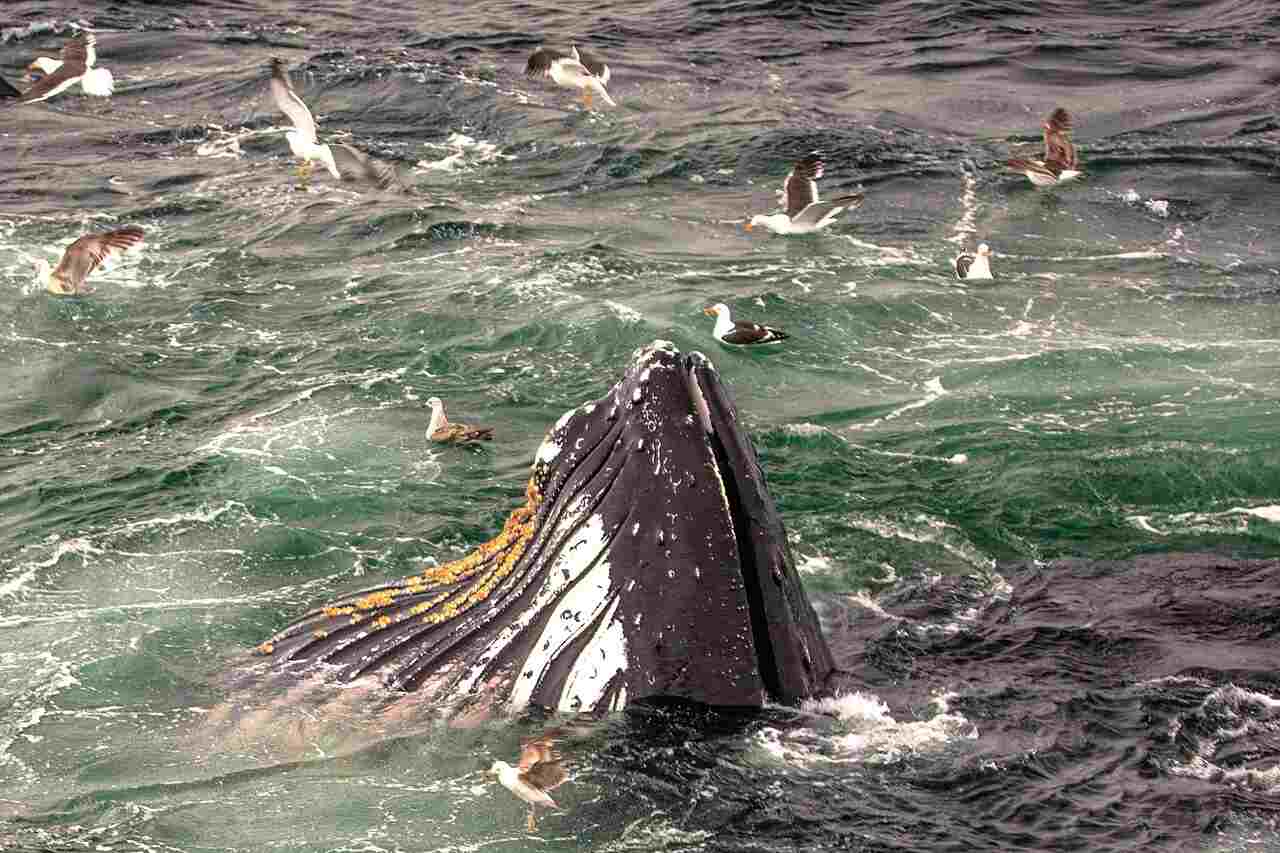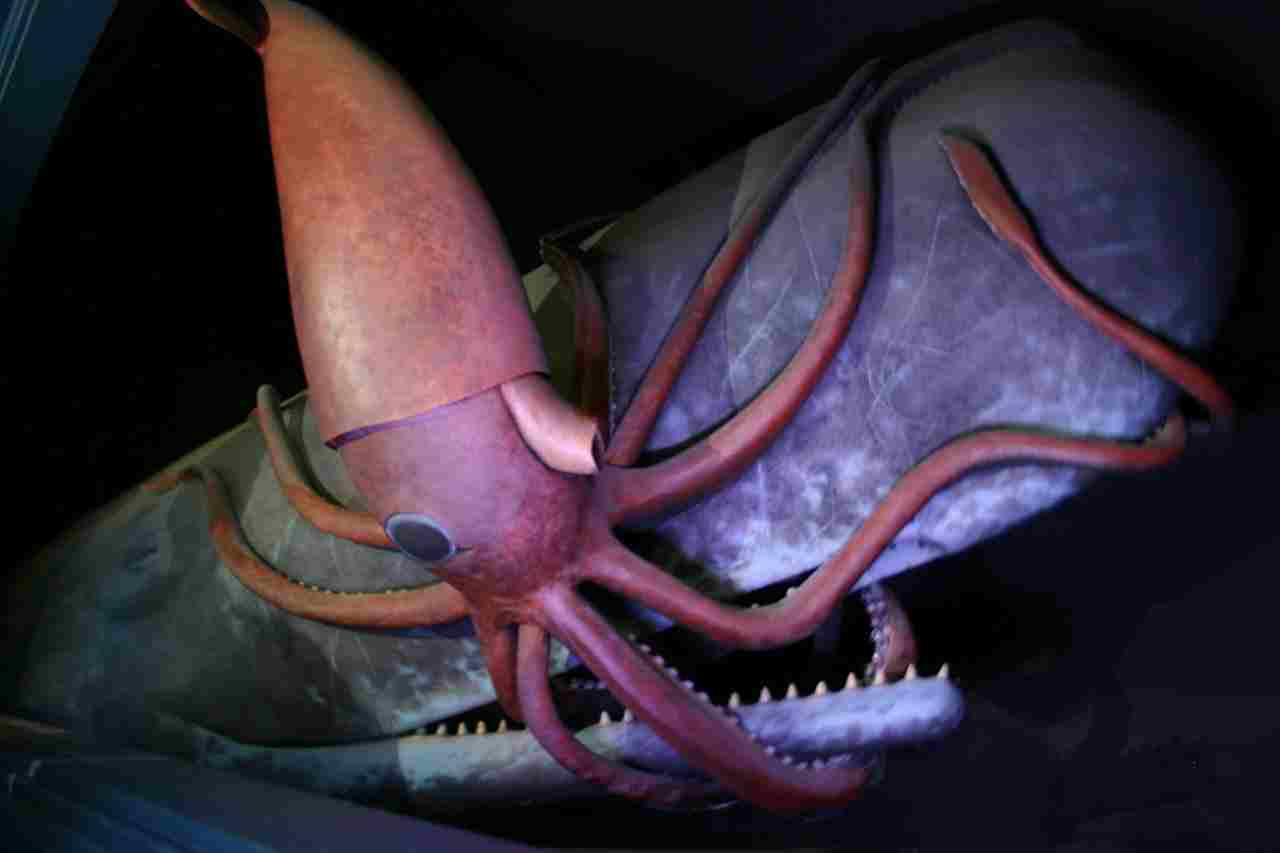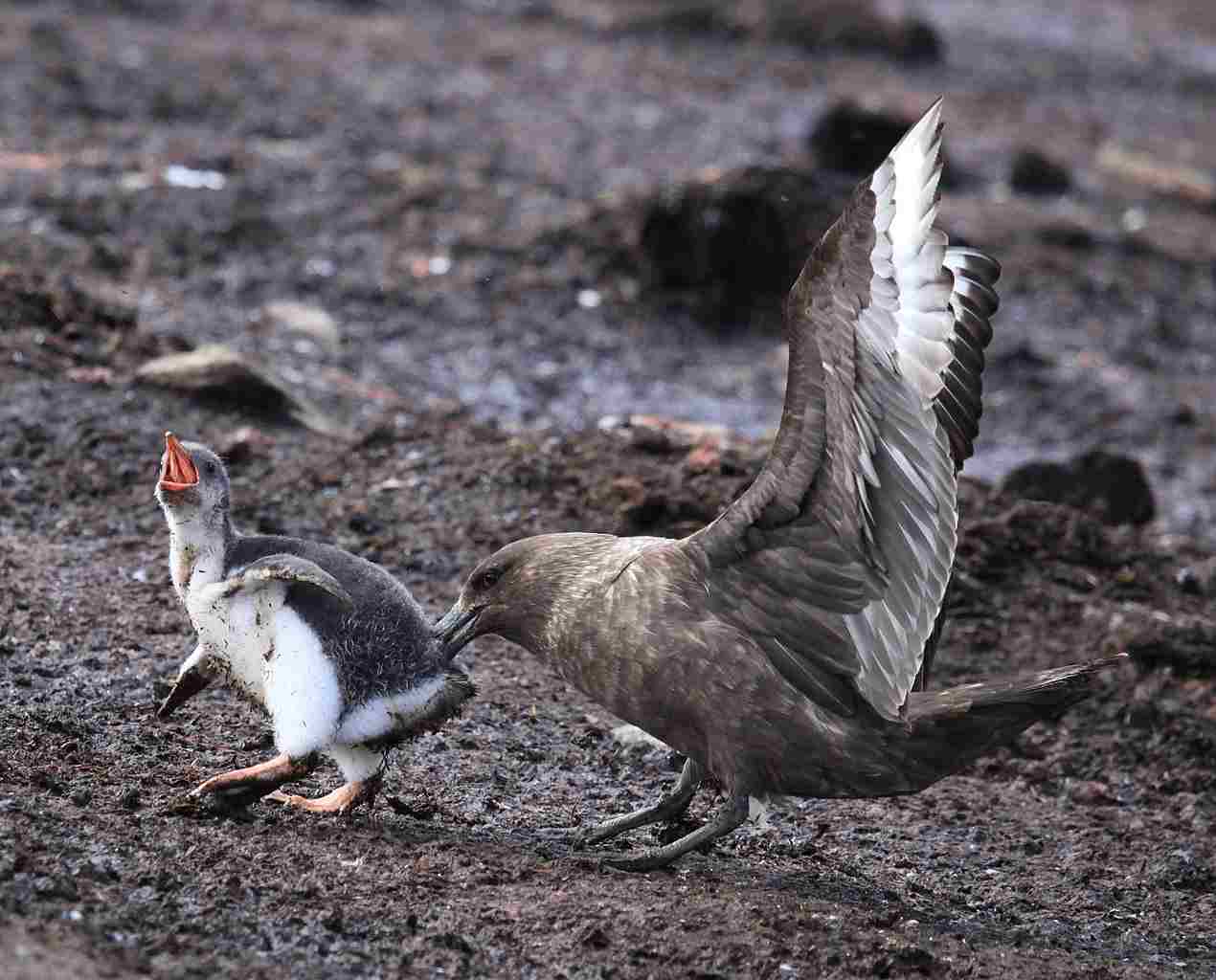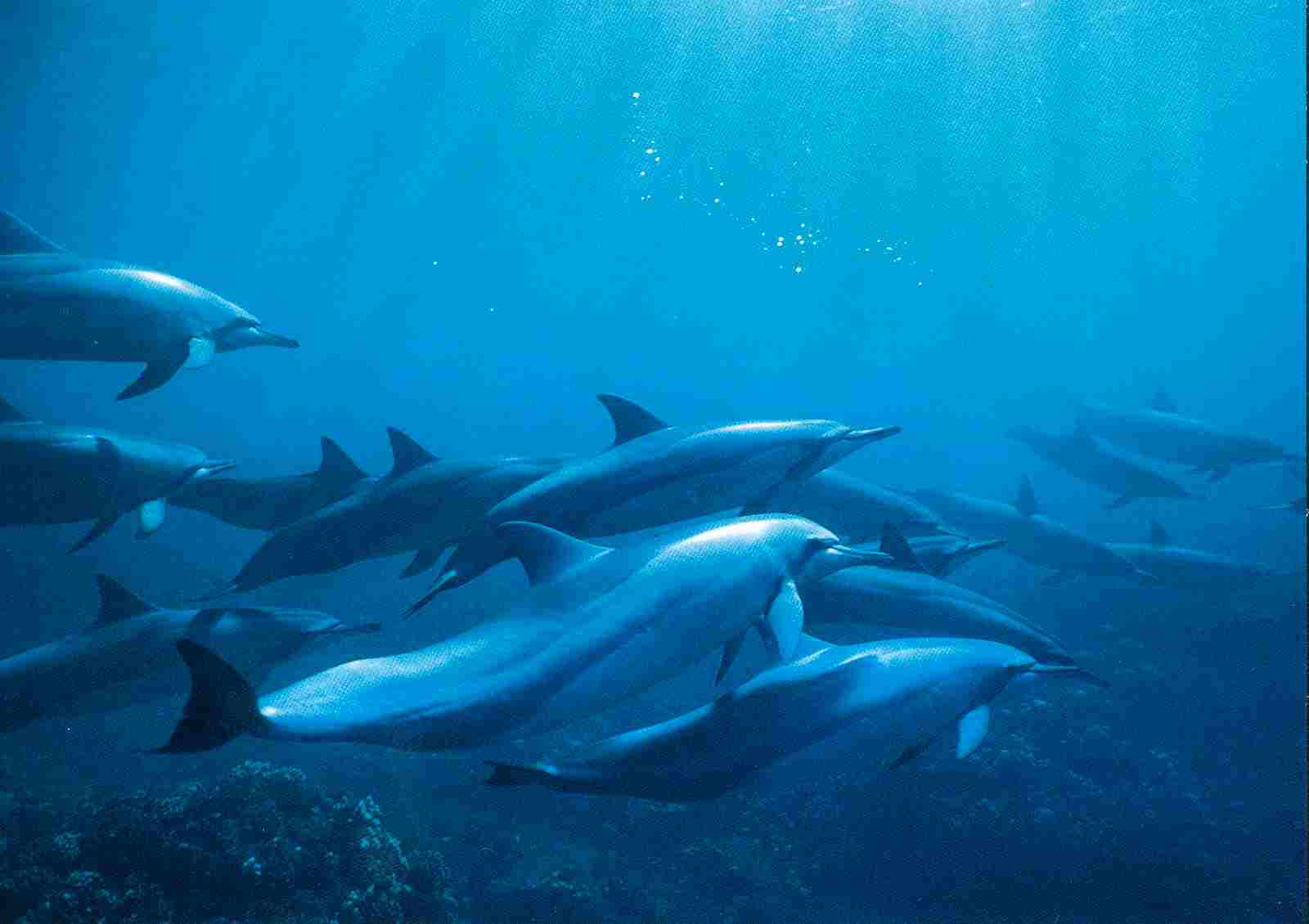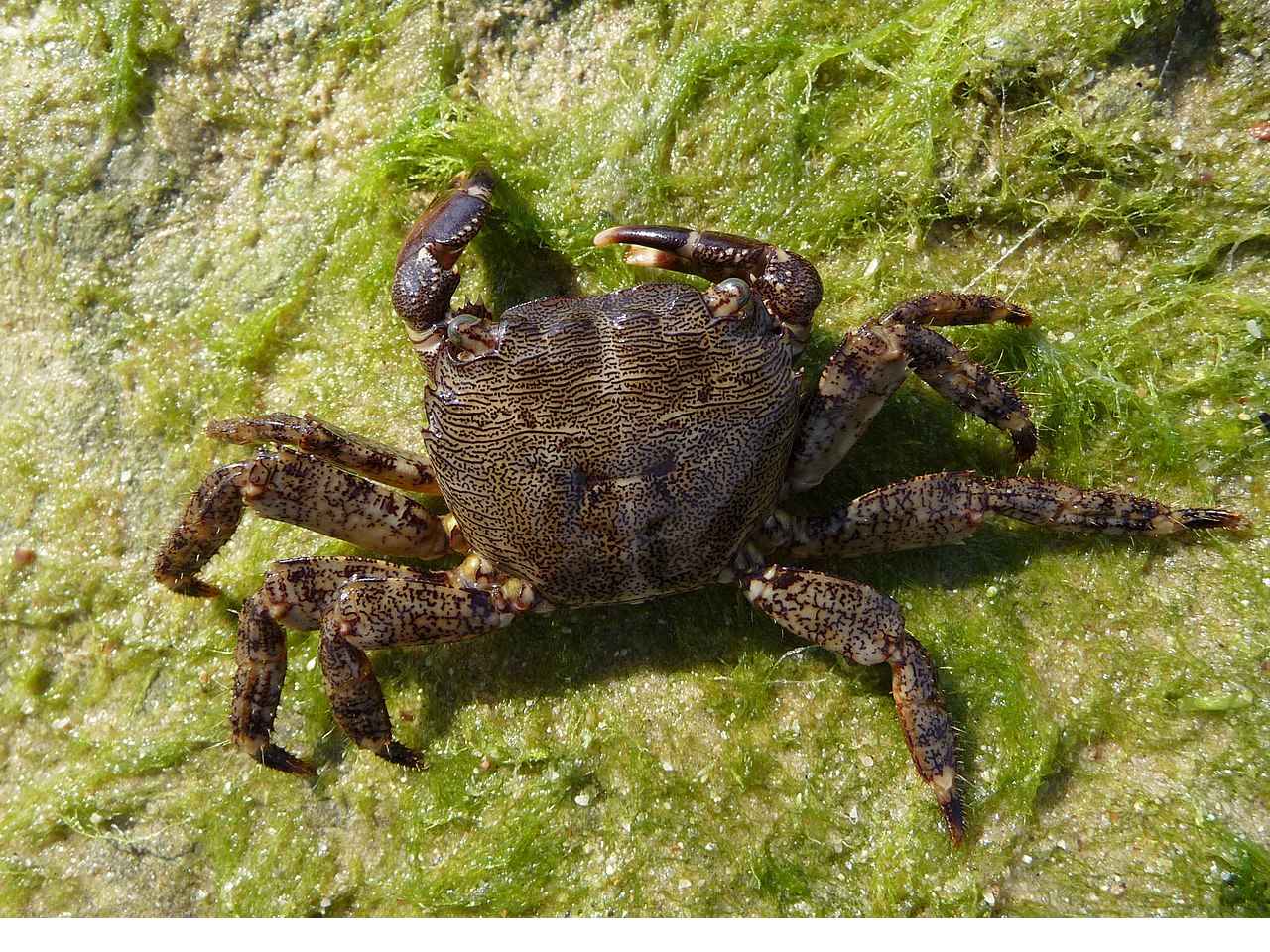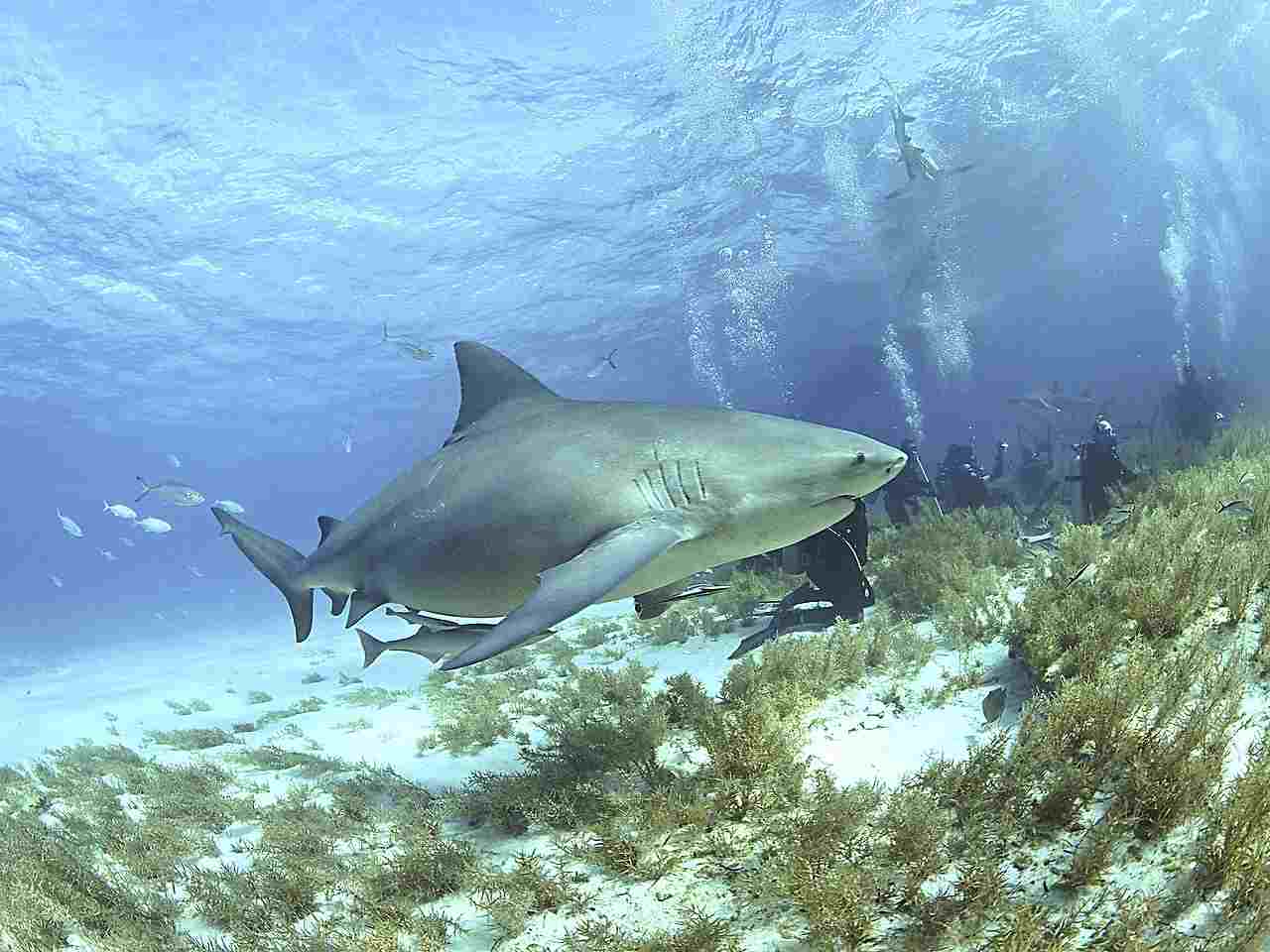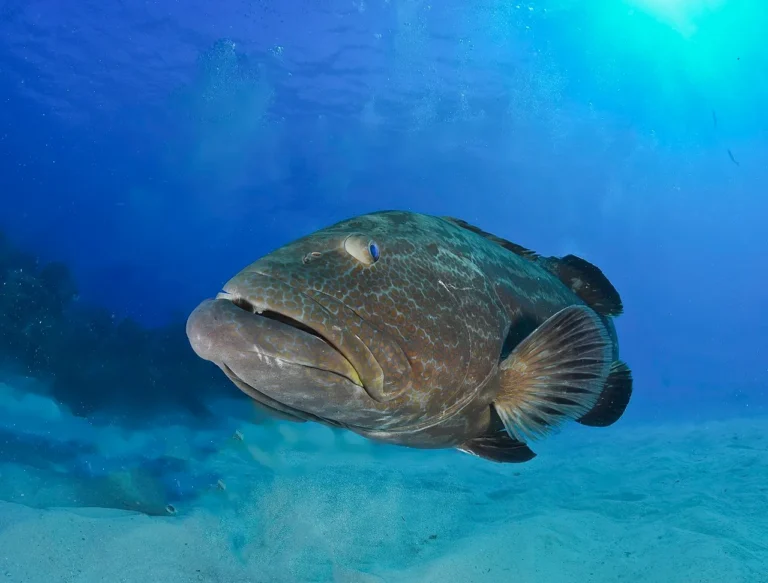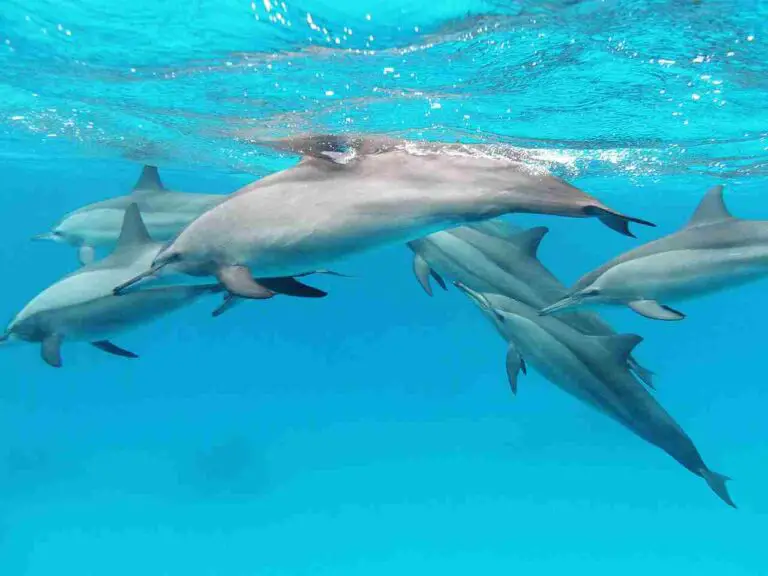Do Sharks Eat Manatees and Octopuses? Overview of Shark Prey Animals
While this is very rare, sharks do eat manatees, along with octopuses, jellyfish, turtles, whales, crabs, stingrays, squid, fish (including other sharks) and penguins.
These prey animals are discussed briefly as follows.
1). Manatees (Do Sharks Eat Manatees?)
Sharks do eat manatees, but it is a very rare occurrence. This is mainly because sharks and manatees do not inhabit the same environment or ecoregion. However, studies have shown that sharks have been known to eat West Indian manatees, as well as other species such as dugongs.
It is important to note that while sharks may prey on manatees occasionally, humans pose the highest predatory threat to these gentle creatures. Human activities such as boat collisions, habitat destruction, and pollution have contributed to the endangered status of manatees.
2). Octopuses (Do Sharks Eat Octopuses?)
While sharks are known to have a diverse diet, including a wide range of prey animals, the consumption of octopuses is not as common as one might think.
Many species of sharks, such as reef sharks, have been observed feeding on octopuses. These cephalopods often make an easy meal for sharks due to their relatively slow movement and lack of defensive mechanisms. However, it is important to note that large octopuses, like the giant Pacific octopus, have been known to turn the tables and feed on sharks. These encounters between sharks and large octopuses are rare but highlight the complex dynamics of predator-prey relationships in the ocean.
For smaller octopuses, they are more likely to fall prey to sharks. Their size and slower movement make them vulnerable targets for shark predation. Sharks have been observed hunting and consuming small octopuses as part of their diet. However, it is worth mentioning that octopuses have evolved various defense mechanisms, such as camouflage and ink release, to evade predators, including sharks.
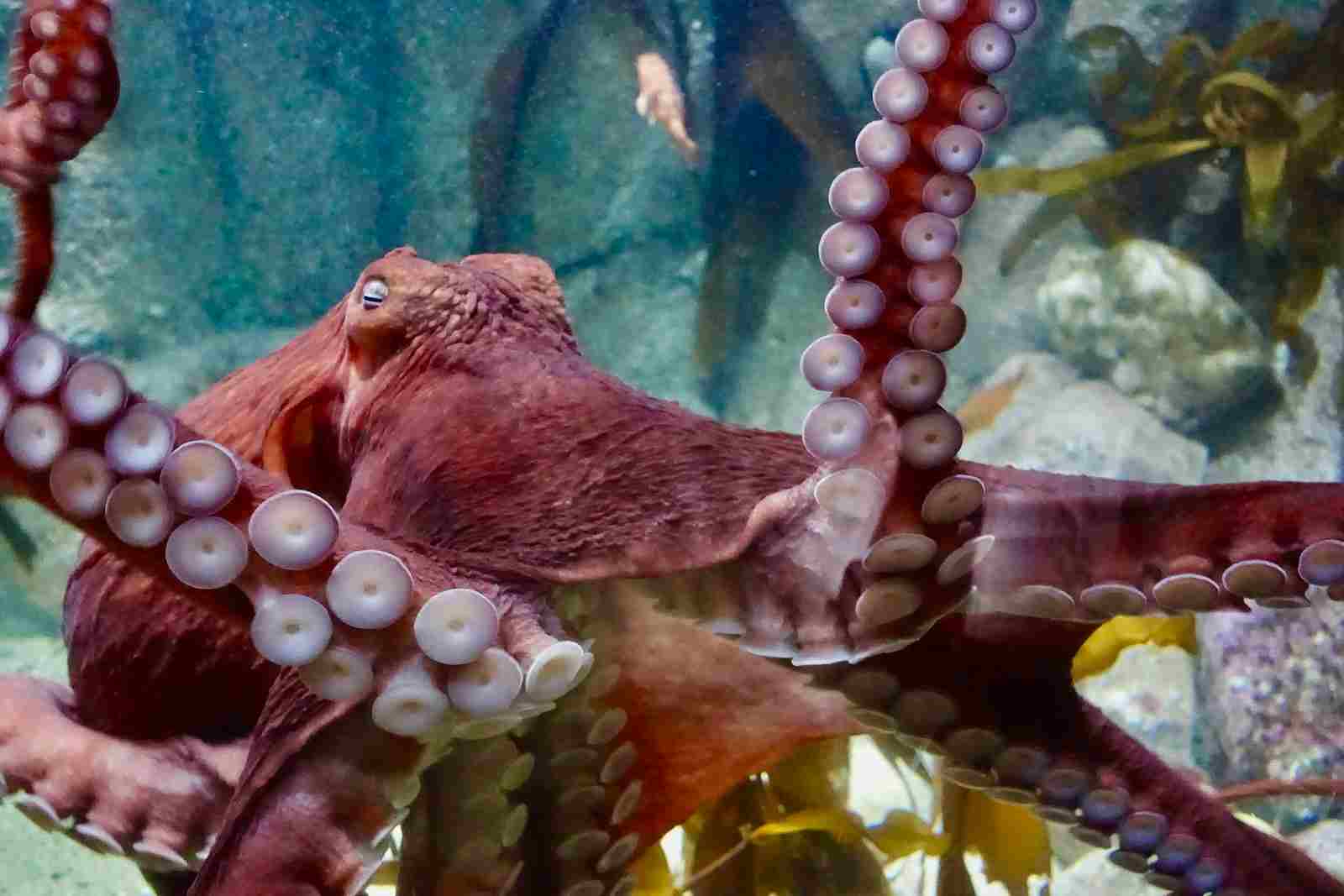
3). Jellyfish (Do Sharks Eat Jellyfish?)
Yes, many species of sharks, including the great white shark and the blue shark, are known to eat jellyfish. This is because jellyfish are abundant in the ocean and are often easy prey for sharks. However, it is important to note that jellyfish are not a main prey or food source for sharks.
Jellyfish are gelatinous creatures that drift in the water, making them vulnerable to predation. Their slow movement and lack of defensive mechanisms make them an attractive target for sharks. Sharks have been observed feeding on jellyfish, especially during times when other food sources may be scarce.
One reason why sharks eat jellyfish is because they are opportunistic feeders. Sharks have a diverse diet and will consume whatever prey is available to them. When jellyfish are abundant in an area, sharks may take advantage of this food source. However, it is worth mentioning that jellyfish are not a primary source of nutrition for sharks.
While sharks do eat jellyfish, they also have to be cautious. Some species of jellyfish, such as the box jellyfish, have venomous tentacles that can cause harm to sharks. Sharks have evolved various strategies to minimize the risk of being stung by jellyfish, such as biting off the tentacles before consuming the jellyfish.
4). Turtles (Do Sharks Eat Turtles?)
Sharks are indeed one of the most prominent predators of turtles. They feed on turtles in various marine habitats, including coastal areas and open ocean. Turtles are a part of the diet for many shark species, such as tiger sharks, bull sharks, and great white sharks.
Turtles can be a valuable food source for sharks due to their high nutritional value. However, it is worth noting that turtles can also pose a choking hazard for sharks. The hard shells and large size of turtles can make it difficult for sharks to consume them without the risk of choking.
Despite this potential challenge, sharks have evolved various feeding strategies to overcome it. Some sharks may bite off smaller pieces of the turtle’s body, while others may use their powerful jaws to crush the shell before consuming the turtle. These adaptations allow sharks to safely consume turtles and extract the maximum nutritional benefit from them.
5). Whales (Do Sharks Eat Whales?)
Whales are not a major prey for sharks, mainly because of their energy-rich blubber. Although sharks sometimes attack and prey on smaller whale species, it is not a common occurrence. Instead, sharks are more commonly known to scavenge on whale carcasses. It is important to note that large whales, such as the sperm whale, can also prey on sharks.
Sharks are more likely to target other marine animals, including mammals like seals, rather than whales. The high fat content of whale blubber makes it a less attractive food source for sharks. However, in certain circumstances, sharks may still attack and feed on whales, especially if they are smaller species.
When sharks do encounter whale carcasses, they can play an important role in the ecosystem by helping to break down and recycle the nutrients from the carcass. This scavenging behavior contributes to the overall health and balance of the marine environment.
6). Crabs (Do Sharks Eat Crabs?)
Hammerhead sharks, along with other species like the smooth dogfish, are known to eat crabs, such as the blue crab. Crabs, along with other crustaceans like lobsters, serve as a supplementary food source for sharks. They are typically consumed when the preferred food source is not available or sufficient.
Sharks have a diverse diet and are opportunistic feeders, meaning they will consume a variety of prey items depending on availability. While sharks may not specifically target crabs as their primary food source, they will take advantage of them when the opportunity arises.
Crabs provide sharks with a source of protein and nutrients, contributing to their overall diet and energy requirements. However, it is important to note that the consumption of crabs by sharks may vary depending on the species and their specific feeding habits. Some sharks may have a higher preference for crabs, while others may consume them less frequently.
7). Fish (Do Sharks Eat Fish?)
As a group, sharks and batoids eat almost anything: fishes, crustaceans, mollusks, marine mammals, and other sharks. While some sharks are probably not very selective feeders, certain sharks eat some foods more than others. One of the most common prey items for sharks is fish.
Fish make up a significant portion of a shark’s diet. They are a readily available food source in most marine environments, and sharks have evolved to be highly efficient predators when it comes to catching and consuming fish. Sharks have a variety of feeding strategies when it comes to hunting fish, depending on their species and habitat.
Some sharks, like the great white shark, are known for their ability to ambush and surprise their prey. They will often stalk their fish prey from below, using their dark dorsal coloration to blend in with the depths of the ocean. When the time is right, they will launch a swift and powerful attack, propelling themselves out of the water to catch their unsuspecting prey.
Other sharks, like the mako shark, are known for their incredible speed and agility. They are capable of swimming at high speeds, allowing them to chase down fast-swimming fish. Makos have a streamlined body shape and a large, crescent-shaped tail fin, which enables them to swim quickly and efficiently. Once they catch up to their fish prey, they will use their sharp teeth to bite and tear into their meal.
Sharks have a wide range of feeding adaptations that allow them to capture and consume fish effectively. Their teeth are designed to grasp and hold onto slippery fish, preventing them from escaping. Some sharks have serrated teeth that are ideal for cutting through the tough scales and flesh of fish. Others have needle-like teeth that are perfect for impaling and securing their prey.
While fish are a common prey item for sharks, it is important to note that not all sharks exclusively eat fish. Some species, like the whale shark, are filter feeders and primarily consume plankton and small organisms. Others, like the tiger shark, have a more varied diet and will consume a wide range of prey items, including fish, marine mammals, and even garbage.
8). Stingrays (Do Sharks Eat Stingrays?)
Stingrays are a fascinating group of marine animals that are closely related to sharks. They have flat bodies and are known for their unique diamond-shaped appearance. But do sharks eat stingrays? The answer is yes, some sharks do prey on stingrays, although it is not a common occurrence.
One shark species that is known to feed on stingrays is the bull shark. Bull sharks are opportunistic predators and will eat a variety of prey, including stingrays. They have a powerful bite and sharp teeth that allow them to capture and consume stingrays with ease. Another shark species that occasionally preys on stingrays is the tiger shark. Tiger sharks have a diverse diet and will consume a wide range of prey, including stingrays.
When hunting stingrays, sharks use their keen senses to detect the presence of these animals. They rely on their sense of smell to locate stingrays hiding in the sand or on the ocean floor. Once a shark has located a stingray, it will use its speed and agility to launch a surprise attack. Sharks are known for their ability to strike quickly and immobilize their prey.
Stingrays have a unique defense mechanism that helps them avoid predation. They have a venomous barb located on their tail, which they can use to defend themselves against predators. If a shark attempts to attack a stingray, the stingray will whip its tail and strike the shark with its barb. The venom in the barb can cause significant injury to the shark, discouraging further predation attempts.
9). Penguins (Do Sharks Eat Penguins?)
Penguins are fascinating creatures that inhabit the cold waters of the Southern Hemisphere. But do sharks eat penguins? While sharks are known to be opportunistic predators, they do not typically prey on penguins.
Penguins have evolved to be excellent swimmers and have adapted to life in the water. They are agile and can swim at high speeds, making it difficult for sharks to catch them. Additionally, penguins often gather in large groups, which provides them with safety in numbers and makes it harder for sharks to single out an individual penguin as prey.
Sharks primarily feed on fish, seals, and other marine mammals, which are more readily available and easier to catch than penguins. Penguins also have a layer of blubber that helps insulate them from the cold water, making them less appealing to sharks as a food source.
While it is rare for sharks to eat penguins, there have been a few documented cases of sharks preying on penguins, particularly in areas where penguins are more vulnerable, such as during molting or when they are on land. However, these instances are the exception rather than the norm.
10). Squid (Do Sharks Eat Squid?)
Squid are fascinating creatures that inhabit the ocean depths. But do sharks eat squid? Yes, sharks are known to prey on squid as part of their diet. Squid are a common food source for many species of sharks, including the great white shark and the tiger shark.
Squid have evolved to be fast swimmers and have excellent camouflage abilities, which helps them evade predators. However, sharks have developed strategies to catch squid. They use their speed and agility to chase down and capture these elusive creatures. Sharks have sharp teeth and powerful jaws that allow them to tear through the squid’s soft body.
Squid are a nutritious and abundant food source for sharks. They are high in protein and contain essential nutrients that sharks need to survive. Squid also have a high energy content, which provides sharks with the fuel they need for their active lifestyle.
Sharks have different hunting techniques when it comes to catching squid. Some species, like the great white shark, use a stealthy approach, lurking in the depths and ambushing their prey. Other species, like the tiger shark, are more aggressive and actively pursue squid in open water.
It’s important to note that not all sharks eat squid. Some species have specialized diets and prefer other types of prey. However, squid are a common and important part of the diet of many shark species.
11). Sharks (Do Sharks Eat Other Sharks?)
Sharks are known for their predatory nature, but do they eat other sharks? Yes, some species of sharks do prey on other sharks. The great white shark and the tiger shark are two examples of sharks that have been observed feeding on other sharks.
The great white shark, known for its powerful bite and sharp teeth, is an apex predator that can take down a variety of prey, including other sharks. It is believed that great white sharks may target smaller or weaker sharks as a source of food.
Similarly, tiger sharks are known to have a diverse diet and are opportunistic feeders. They have been found to consume a wide range of prey, including other sharks. Tiger sharks have strong jaws and serrated teeth that allow them to tear through the flesh of their prey, including other sharks.
The cannibalistic behavior of sharks is not common, and it is believed to occur mainly when other food sources are scarce. Sharks are highly adaptable predators and will consume whatever prey is available to them.
Conclusion
Throughout this article, we have explored the various prey animals that sharks consume.
1) Manatees
While sharks are not typically known to target manatees as prey, there have been rare instances where manatees have been found with shark bite marks. However, these incidents are infrequent, and manatees are not a primary food source for sharks.
2) Octopuses
Sharks do not commonly prey on octopuses. Octopuses have the ability to camouflage themselves and use their ink as a defense mechanism, making them less vulnerable to shark attacks.
3) Jellyfish
Some species of sharks, such as the whale shark, feed on jellyfish. These sharks have specialized filter-feeding mechanisms that allow them to consume large quantities of jellyfish.
4) Turtles
Sharks are known to prey on turtles, especially when they are young and vulnerable. Tiger sharks, in particular, have been observed feeding on sea turtles.
5) Whales
While sharks are not typically known to prey on adult whales, there have been instances where sharks scavenge on whale carcasses. They primarily target the blubber and soft tissues of the deceased whales.
6) Crabs
Sharks do not commonly target crabs as their primary prey. However, if a shark comes across a crab, it may consume it opportunistically.
7) Fish
Fish make up a significant portion of a shark’s diet. Sharks have a diverse range of feeding strategies, including ambush predation and chasing down fast-swimming fish.
8) Stingrays
Sharks, such as the bull shark, feed on stingrays. They use their powerful jaws and teeth to capture and consume these flat-bodied creatures.
9) Penguins
Sharks are not known to specifically target penguins as prey. Penguins spend most of their time in the water, but their agility and ability to swim quickly make them less vulnerable to shark attacks.
10) Squid
Sharks, such as the mako shark, feed on squid. These sharks have sharp teeth and powerful jaws that allow them to capture and consume squid.
11) Sharks
While cannibalistic behavior among sharks is not common, some species, such as the great white shark and the tiger shark, have been observed feeding on other sharks. This behavior is believed to occur mainly when other food sources are scarce
FAQs
1). Do Sharks Eat Dolphins?
Yes, sharks do eat dolphins, but it is more common for smaller shark species to prey on dolphins rather than larger ones. Dolphins are highly intelligent and agile marine mammals, making them a challenging target for larger sharks. However, smaller shark species, such as the bull shark or the dusky shark, have been documented feeding on dolphins.
Dolphins have a strong social structure and are known to defend each other when threatened. They are also fast swimmers and have the ability to outmaneuver many shark species. These factors make it less likely for larger sharks to successfully prey on dolphins.
It is important to note that while sharks may occasionally eat dolphins, it is not a common occurrence. Dolphins have a wide range of food sources, including fish and squid, which are more readily available and easier to catch. Sharks, on the other hand, have a diverse diet that includes various marine animals, depending on their species and habitat.
2). Do Humans Eat Manatees?
Humans pose the greatest threat to the survival and existence of manatees. While manatees are protected by laws in many countries, they are still hunted and killed for their meat and skin. In some cultures, manatee meat is considered a delicacy and is consumed as part of traditional dishes. The demand for manatee products, such as oil and bones, also contributes to their hunting.
Illegal hunting and poaching further exacerbate the issue, as manatees are often targeted for their valuable body parts. This illegal trade not only threatens the manatee population but also undermines conservation efforts.
Efforts are being made to raise awareness about the importance of protecting manatees and their habitats. Conservation organizations work to educate local communities and enforce laws to prevent the hunting and consumption of manatees. Additionally, sustainable alternatives are being promoted to reduce the demand for manatee products.
3). What Animals Are Sharks Afraid Of?
Sharks are apex predators and are not typically afraid of many animals. However, there are larger predators, including large whales, that sharks may avoid. The size and strength of these marine mammals can pose a threat to sharks, especially if they feel threatened or cornered.
Whales, with their massive size and powerful tails, have the ability to defend themselves against potential shark attacks. This natural defense mechanism may deter sharks from approaching or engaging with whales. While sharks are known for their fearlessness, they still exhibit caution when encountering animals that have the potential to harm them.
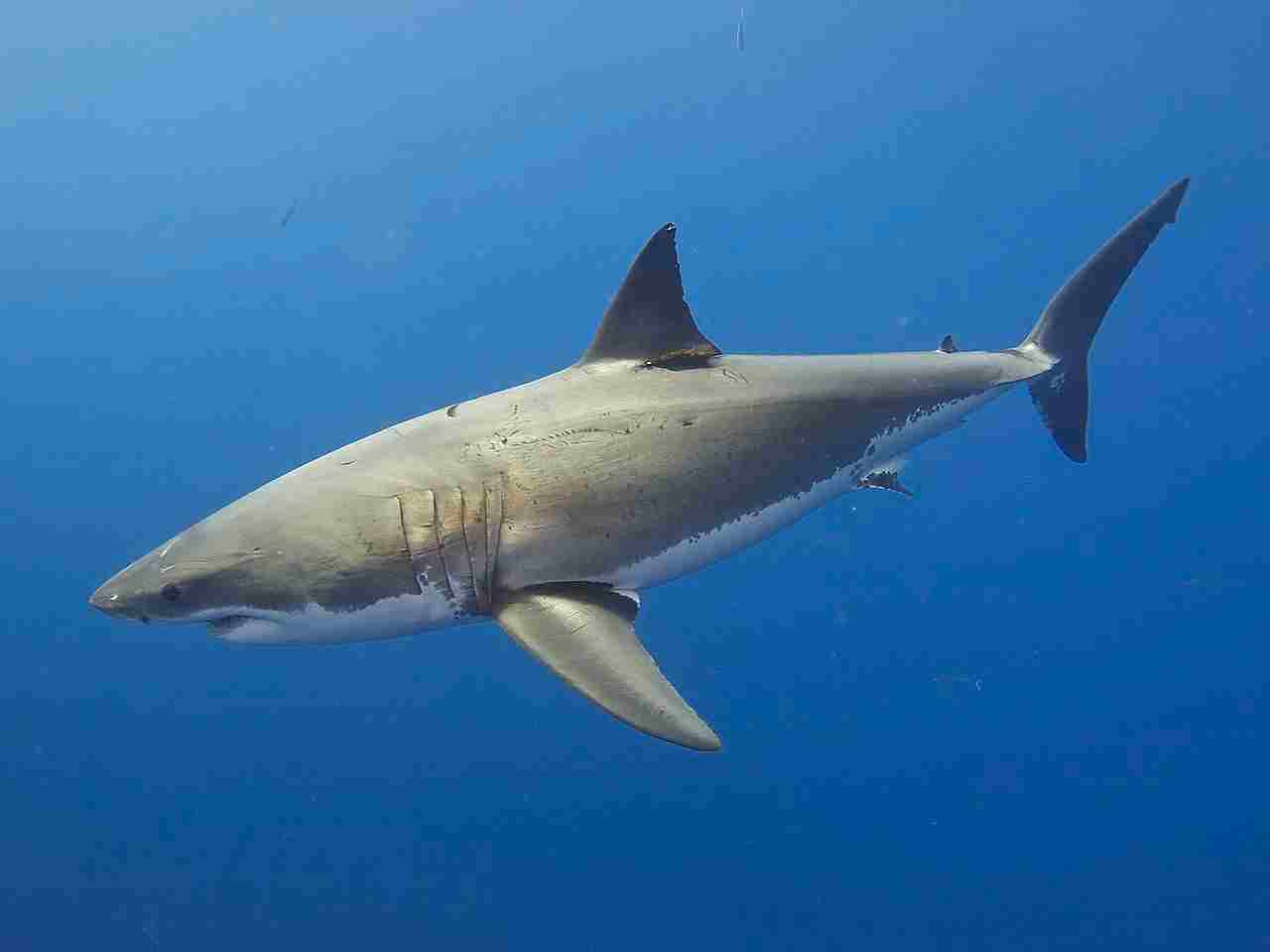
4). Why are Sharks Scared of Dolphins?
Sharks are known for their fearlessness, but there are instances where they exhibit caution around dolphins. While it is not a general rule, some sharks may be scared of dolphins. One possible reason for this is the agility and speed of dolphins. Dolphins are incredibly fast swimmers and can outmaneuver sharks with their acrobatic movements.
This makes it difficult for sharks to catch them as prey or defend themselves against a potential attack. Additionally, dolphins are highly social animals and often travel in groups, which can intimidate sharks. The collective strength and coordination of a dolphin pod can deter sharks from approaching or engaging with them.
5). Can Sharks and Dolphins Mate?
No, sharks and dolphins cannot mate with each other. While they may share some similarities, such as being highly intelligent and living in the same ocean habitats, they belong to different taxonomic groups.
Sharks are a type of fish, specifically cartilaginous fish, while dolphins are mammals. This fundamental difference in their classification means that their reproductive systems are not compatible. Sharks reproduce by laying eggs or giving birth to live young, depending on the species, while dolphins give birth to live young after a gestation period.
Furthermore, sharks and dolphins have distinct anatomical differences that prevent successful mating. Sharks have claspers, which are specialized reproductive organs, while dolphins have a more complex reproductive system. These differences in reproductive anatomy make it physically impossible for sharks and dolphins to mate and produce offspring.
Although sharks and dolphins may interact in the ocean, such as during feeding frenzies or when dolphins ride the bow waves created by sharks, their interactions are purely based on survival instincts and not for reproductive purposes.
6). Are Sharks Faster Than Dolphins?
In general, sharks are not faster than dolphins. Dolphins are known for their incredible speed and agility in the water, making them some of the fastest swimmers in the ocean. They can reach speeds of up to 20-25 miles per hour, allowing them to easily outpace most sharks.
However, it’s important to note that the speed of sharks can vary depending on the species. Some shark species, such as the shortfin mako shark, are known for their impressive speed and can swim at speeds of up to 45 miles per hour. But even with their exceptional speed, they are still not as fast as dolphins.
7). Do Sharks Eat Manatees in the Ocean?
Sharks eating manatees in the ocean is a rare occurrence. While it is possible for sharks to prey on manatees, it is not a common behavior. Sharks and manatees do not typically share the same habitat, which reduces the chances of encounters between the two species.
Manatees are herbivorous marine mammals that inhabit shallow coastal waters, estuaries, and rivers. They primarily feed on aquatic plants and have a slow-moving nature. On the other hand, sharks are carnivorous predators that inhabit a wide range of oceanic habitats. They have a preference for hunting fish, seals, and other marine mammals.
Although sharks have been known to attack manatees on occasion, these incidents are relatively rare. Manatees are large and slow-moving, making them less vulnerable to shark attacks compared to smaller, faster prey. Additionally, manatees often inhabit areas with shallow waters and vegetation, which may provide some level of protection against shark predation.
8). What Eats Octopuses?
There are several large predators that consider octopus a tasty meal. One such predator is the shark. Sharks have been known to prey on octopuses, especially when they come across them in their oceanic habitats. The powerful jaws and sharp teeth of sharks make them formidable hunters, capable of capturing and consuming octopuses.
Another predator of octopuses is the moray eel. These eels have a slender body and a strong bite, which allows them to catch and devour octopuses with relative ease. Additionally, some species of fish, such as groupers and snappers, also feed on octopuses. These fish have a voracious appetite and are skilled hunters, making them a threat to octopuses in their natural environment.
9). Do Sharks Eat Squid?
Yes, sharks do eat squid. Squid is a common prey item for many species of sharks, especially those that inhabit the open ocean. Sharks have a diverse diet, and squid is often a preferred choice due to its abundance and high nutritional value.
Squid are fast-swimming and agile creatures, but sharks are skilled predators that can easily catch and consume them. Sharks have sharp teeth and powerful jaws that allow them to tear through the squid’s soft body and consume it whole. Some species of sharks, such as the great white shark and the mako shark, are known to actively hunt and feed on squid.
Squid make up a significant portion of a shark’s diet in certain regions and during specific seasons. They are an important food source for sharks, providing them with essential nutrients and energy. The consumption of squid by sharks also helps to regulate the population of these cephalopods, maintaining a balance in the marine ecosystem.
10). Do Octopus and Sharks Fight?
Octopus and sharks do engage in occasional encounters, especially in cases where their territories overlap. These interactions can be intense and fascinating to observe. Octopuses have evolved various defense mechanisms to protect themselves from predators, including sharks. They can use their camouflage abilities to blend into their surroundings, making it difficult for sharks to detect them.
Additionally, octopuses have been known to use their powerful arms to deliver a swift and unexpected strike to deter sharks. However, it’s important to note that these encounters are not common, as octopuses typically prefer to avoid confrontation with sharks and rely on their camouflage and agility to stay safe.
11). What do Sharks Eat?
Sharks have a diverse diet that includes a wide range of prey. They are opportunistic feeders and will consume whatever is available in their environment. Some common food sources for sharks include fish, squid, seals, sea lions, and sea turtles. Sharks are also known to eat smaller sharks and rays. In addition to these marine creatures, sharks may also consume birds that accidentally fall into the water.
Sharks have a keen sense of smell and can detect blood from miles away, which helps them locate potential prey. They are particularly attracted to the scent of injured or distressed animals.
12). Do Sharks Eat Octopuses in the Ocean?
While sharks are opportunistic feeders, octopuses are not a common prey item for them. Octopuses have several defense mechanisms that make them challenging targets for sharks. Their ability to camouflage and their agility in the water allow them to evade predators effectively.
Additionally, octopuses can release ink to confuse and distract potential attackers. However, in rare cases, larger species of sharks may attempt to prey on octopuses if they are unable to escape.
13). How do Octopus Kill Sharks?
One of the most effective ways octopuses can kill sharks is by using their powerful beak to deliver a lethal bite. The beak is located at the center of their tentacles and can easily penetrate the shark’s skin.
In addition to their beak, octopuses also have the ability to inject venom into their prey. This venom contains a powerful neurotoxin that can paralyze the shark, making it easier for the octopus to overpower and kill its attacker.
Furthermore, octopuses are incredibly flexible and can squeeze into tight spaces, allowing them to escape from the jaws of a shark. Their ability to camouflage and blend into their surroundings also helps them avoid detection and potential attacks.
14). Can a Shark Get Stung by a Jellyfish?
Yes, a shark can get stung by a jellyfish. Sharks are not immune to the stinging cells of jellyfish, known as nematocysts. When a shark comes into contact with a jellyfish, the nematocysts can release toxins that can cause irritation and discomfort to the shark’s skin and eyes.
However, it is important to note that sharks have a thick layer of tough skin that provides some protection against jellyfish stings. Additionally, sharks are constantly moving, which helps to minimize the chances of prolonged contact with jellyfish.
15). Do Sharks Eat Puffer Fish?
Yes, sharks do eat puffer fish. Unlike other predators that are affected by toxins, many shark species consume puffer fish without apparent effects. Puffer fish are known for their ability to inflate their bodies when threatened, making them appear larger and more difficult to swallow. However, this defense mechanism is not always effective against sharks.
Sharks have powerful jaws and sharp teeth that allow them to tear through the tough skin and spines of puffer fish. They are able to consume the entire fish, including the toxic parts. It is believed that sharks have developed a tolerance to the toxins found in puffer fish, allowing them to safely consume these prey items.
It is important to note that not all shark species eat puffer fish. Some sharks may prefer other types of prey, depending on their size, habitat, and feeding behavior. However, for those sharks that do consume puffer fish, it is just another item on their diverse menu of marine life.
16). Do Sharks Eat Box Jellyfish?
Box jellyfish are known for their potent venom and are considered one of the most dangerous creatures in the ocean. While sharks are formidable predators, they generally do not eat box jellyfish. The venomous tentacles of box jellyfish can be harmful to sharks, causing irritation and discomfort.
However, it is important to note that sharks may accidentally come into contact with box jellyfish while hunting for other prey. In these cases, the sharks may bite or attack the jellyfish, but they do not typically consume them as a regular part of their diet. Other predators such as green sea turtles, sunfish, and tuna are more likely to feed on box jellyfish.
17). Do Sharks Eat Starfish?
Sharks, particularly bottom-dwelling species, may occasionally eat starfish, but it is not their preferred food source. Starfish do not provide the necessary nutritional needs for sharks, so they often avoid consuming them. However, in some cases, sharks may feed on starfish as a supplement to their diet.
While sharks have a diverse diet that includes fish, seals, and even other sharks, starfish are not a significant part of their regular menu. Sharks are more likely to target prey that is higher in protein and fat content, which starfish lack. Additionally, starfish have a hard exoskeleton that can be challenging for sharks to consume.
It’s important to note that the feeding habits of sharks can vary depending on the species and their specific environment. Some species may have a higher inclination to eat starfish than others. However, overall, starfish are not a primary food source for sharks.
18). Can Shark Break Sea Turtle Shell?
Yes, sharks can break sea turtle shells using their serrated teeth. However, it is not a common occurrence. Sea turtle shells are incredibly strong and durable, providing excellent protection for these marine reptiles. Sharks may attempt to bite into the shell, but in most cases, they are unable to penetrate it.
While sharks have powerful jaws and sharp teeth, the structure of a sea turtle shell is designed to withstand predator attacks. The shell is made up of bony plates called scutes, which are fused together to form a solid shield. This makes it difficult for sharks to break through and access the soft tissues inside.
It’s important to note that sea turtles have evolved various defense mechanisms to avoid predation, including their ability to retract their head and flippers into their shell. This further reduces the chances of a shark successfully breaking the shell.
19). Are Sharks Afraid of Whales?
Sharks are known for their dominance in the ocean, but when it comes to whales, not all species of sharks are fearless. While some sharks may show no fear towards whales, others exhibit caution and even avoid them altogether.
One reason why sharks may be afraid of whales is their sheer size. Whales are the largest creatures in the ocean, and their massive presence can intimidate even the most formidable predators. The size difference alone can make sharks think twice before approaching a whale.
Another factor that contributes to sharks’ fear of whales is their powerful tails. Whales possess immense strength in their tails, which they can use to defend themselves against potential threats. A single swipe from a whale’s tail can cause significant harm to a shark, making it a risky encounter for the predator.
Additionally, some species of whales are known to exhibit protective behavior towards their young. If a shark poses a threat to a whale calf, the adult whale may become aggressive and defend its offspring. This defensive behavior can deter sharks from approaching whales, as they know they will face a formidable opponent.
20). What do Sharks Mostly Eat?
Sharks mostly feed on smaller fish and invertebrates. These smaller fish serve as the main source of sustenance for sharks, providing them with the necessary nutrients and energy. Some common examples of fish that sharks feed on include herring, mackerel, and sardines. In addition to fish, sharks also consume a variety of invertebrates such as squid, octopuses, and crustaceans.
These invertebrates offer a different nutritional profile and help to supplement the shark’s diet. Sharks are opportunistic predators, meaning they will eat whatever is available and abundant in their environment. This adaptability allows them to thrive in various ecosystems and maintain their position as apex predators.
21). Do Sharks Eat Cleaner Fish?
Sharks generally do not eat cleaner fish. Cleaner fish provide an ecological service by removing parasites and dead skin from the bodies of larger fish. This symbiotic relationship benefits both the cleaner fish and the larger fish, as the cleaner fish get a meal and the larger fish get cleaned.
Sharks are more focused on feeding on other fish and invertebrates that serve as their main source of sustenance.
